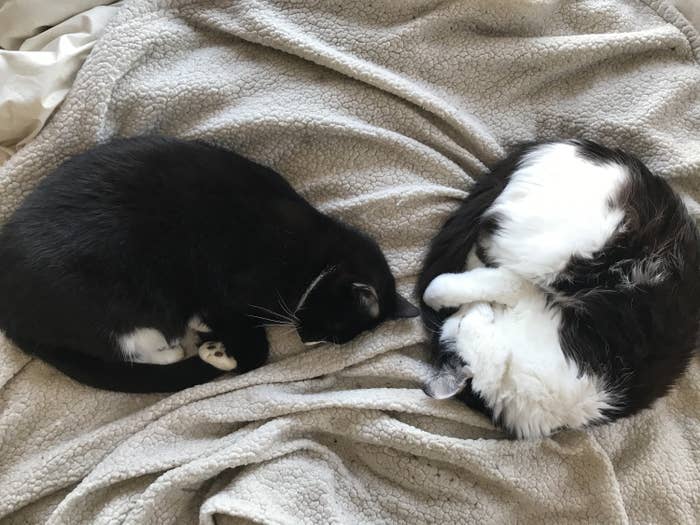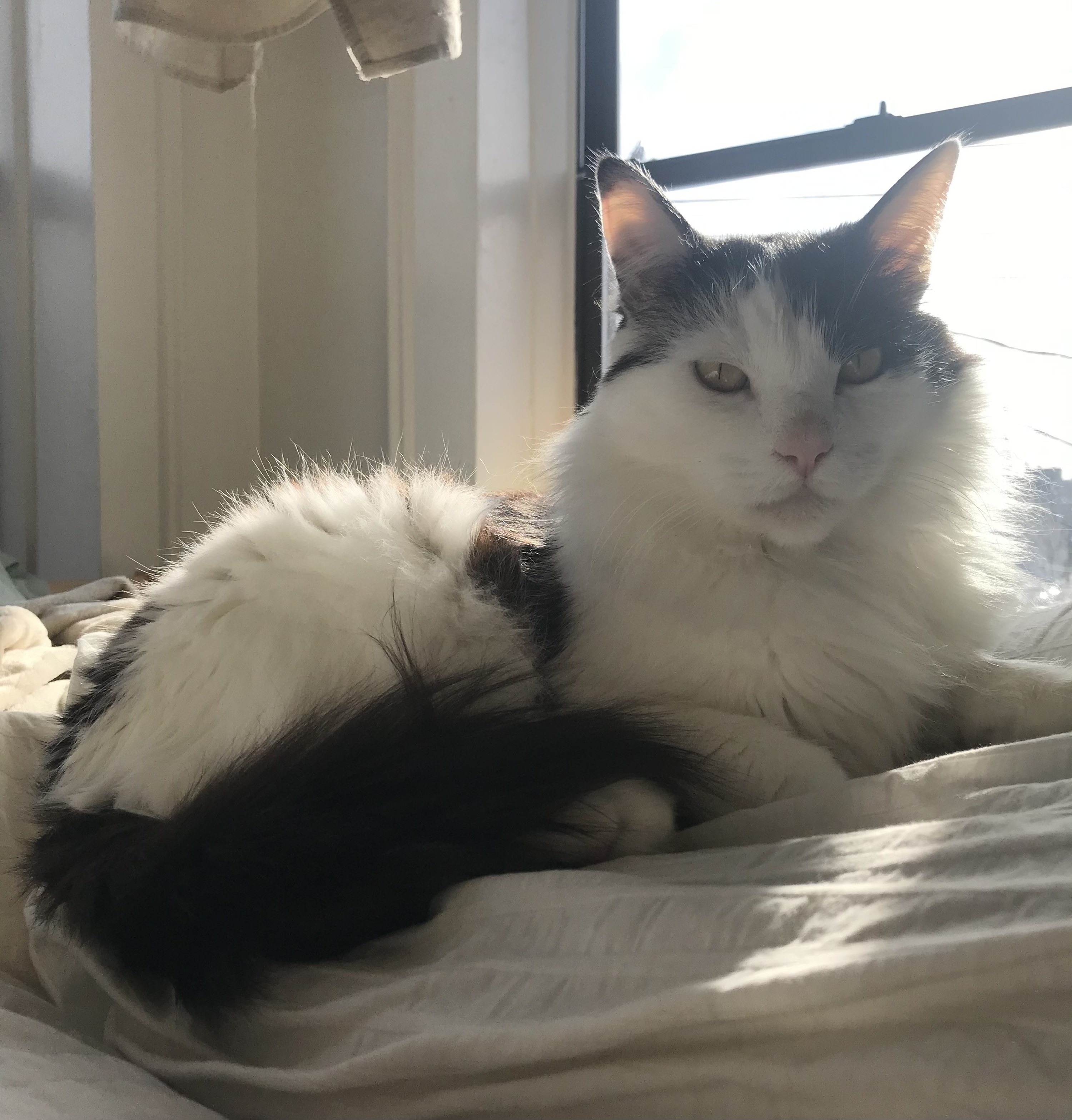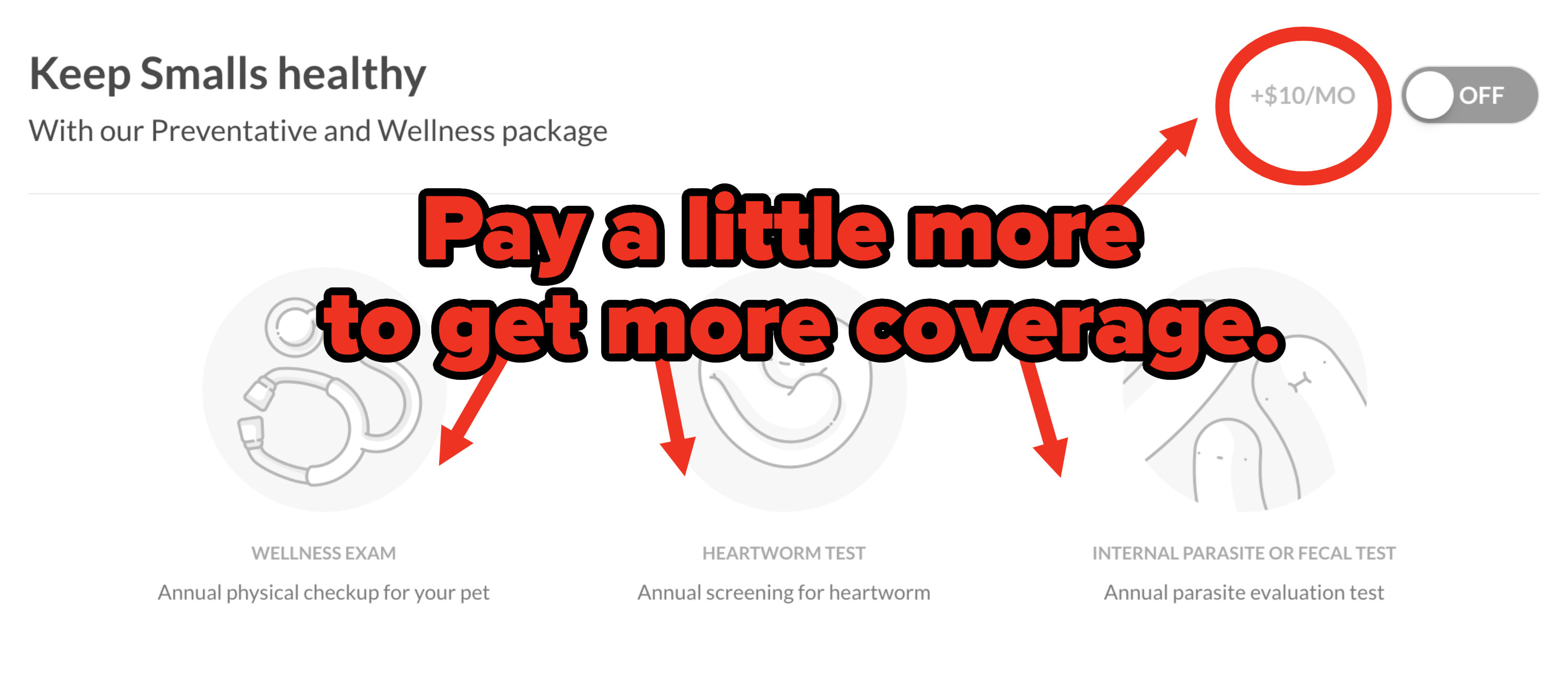Pretty much everyone who knows me knows I have two cats and I'm more than a little bit obsessed with them. I mean, just look at them napping on their favorite fuzzy blanket:

Having a pet can be so rewarding, but you ~fur sure~ need to be ready for all the costs involved in their care. Regular vaccinations, healthcare, food, litter, toys, and cat-sized bowties can really add up. So I try to find ways to save when I can, and lately I've been super curious about pet insurance.
Me, spending all my money on my dog
First of all, having insurance for my little guys just sounds so grown-up and responsible! But before taking out a policy, I wanted to make sure I understand all the nitty-gritty details and what all that insurance jargon means. And I also wanted to figure out how to tell if a pet insurance policy is even worth it.
So I video-chatted with Mark Reyes, a certified financial planner who works with the financial wellness app Albert. Oh, and his rescue dog Chance sat in too. Good boy, Chance.
Pet insurance works kinda like human health insurance: You pay a monthly charge, aka a premium, for your pet's policy. Then, when they need to see the vet, you pay out-of-pocket up to a certain amount (called the deductible). Once you've met your deductible, the insurance will kick in and start helping you cover the costs.
Okay, sounds simple enough, but can pet insurance ~actually~ help you save money at the vet? In the video below, Mark and Chance do the math to show how their pet insurance policy is working for them:
I absolutely loved the way that Mark broke this down and made it so easy to understand, so I asked for his thoughts on a couple of other pets. First up, meet my coworker Melissa's dog Rush.

According to Mark, a pet like Rush could be a great candidate for pet insurance. "Usually the younger the dog, the cheaper the premium may be," he explained. And low premiums mean you have to spend less at the vet every year to break even. Plus, since Rush doesn't have any pre-existing conditions, it's more likely that a pet insurance policy would cover it if he did develop a condition later on.
But what if your pet *does* have a pre-existing condition? Well, let's go back to my buddy Lebowski for that.

Well, for a dude like Lebowski, insurance might not cover so many of his costs. Pet policies don't have to cover pre-existing conditions, and insurance probably wouldn't make a dent in his food bill either. "I don't think food is covered by most pet insurance, but prescription drugs are covered by certain policies," Mark said. For Lebowski, it might make more financial sense to set up an emergency fund and save up on my own instead.
So we've looked at a young 'n' healthy pup and a kitty with a pre-existing condition, but where do senior pets fit in? For answers there, say hi to my coworker Hannah's pal Harvey.

Mark thinks that for an older pet like Harvey, it might not be such a good idea to start a policy now if they've never had insurance before. "The monthly premium may be anywhere from $100 to $120 for that dog. So that might equal $1,200 to $2,000 a year [just for the premium], which may not make sense." Since the premiums are so high for older pets and pets tend to have more pre-existing conditions as they age, pet insurance could very likely end up costing more yet covering less.
So the decision to take out a pet insurance policy really has just as much to do with your pet's health and age as it does with your budget. It's a totally individual decision. But if you think that a pet insurance policy might suit you and your little pal's needs, there are just a few more things to consider.
And there are also different kinds of pet insurance policies out there. Mark says, "Sometimes you can just get a basic catastrophic kind of policy where like extreme surgeries are covered but flea medicine, heartworm, and vaccinations are not covered. If you want that coverage, you'd have to pay a little more each month."

One last factor in deciding if pet insurance is right for you is your own personal tolerance for risk. Are you okay with spending money on an insurance policy while your pet is healthy so you can save money if or when they get sick? Or would you rather stash away savings on your own and deal with vet bills as they happen?
Whether pet insurance is right for you or not, it's a really good idea to have a plan in place that can help you cover vet bills. After all, even with insurance, you still have to pay upfront for your pet's care.
And in addition to pet insurance, Mark offered up a few more tips that can help pet owners save money:
Finally, Mark always recommends adopting a pet from a shelter rather than going to a breeder. "I'm a sweetheart for those dogs in the shelters who've had a past life and deserve a second chance, and financially, adopting is much cheaper."
What are your best tips for saving money as a pet owner? Tell us what's worked for you in the comments below.
And for more money tips and tricks, check out the rest of our personal finance posts.
